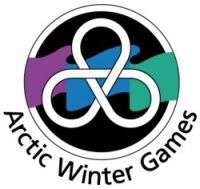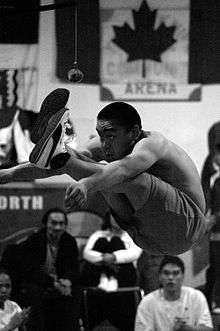Arctic Winter Games
The Arctic Winter Games is an international biennial celebration of circumpolar sports and Indigenous culture.
 Arctic Winter Games Logo | |
| First event | 1970 in Yellowknife, Northwest Territories, Canada |
|---|---|
| Occur every | 2 years |
| Last event | 2018 Arctic Winter Games held in Hay River/Fort Smith |
| Purpose | Sports for the Arctic |
| President | Gerry Thick |
| Website | ArcticWinterGames.org |

Background
The Arctic Winter Games were founded in 1969 under the leadership of Governor Walter J. Hickel of Alaska, Stuart M. Hodgson, Commissioner of the Northwest Territories, and Yukon Commissioner James Smith. The idea to "provide a forum where athletes from the circumpolar North could compete on their own terms, on their own turf" came from Cal Miller, an advisor with the Yukon team at the 1967 Canada Winter Games.
In 1970 in Yellowknife, Canada, 500 athletes, trainers and officials came together for the first Arctic Winter Games. The participants came from the Northwest Territories, Yukon and Alaska. Since then, the Games have been held on fifteen occasions in different places and with ever more participants from more and more places within the Arctic region. The games in 2002 were the first jointly hosted Arctic Winter Games, by Nuuk, Greenland and Iqaluit, Nunavut.
Sports disciplines
Games include:[1]
- Alpine skiing
- Arctic Sports and Dene Games
- Badminton
- Basketball
- Biathlon
- Cross-country skiing
- Curling
- Dog Mushing
- Figure skating
- Gymnastics
- Ice hockey
- Indoor soccer
- Snowboarding
- Snowshoe biathlon
- Snowshoe running
- Speed skating
- Volleyball
- Wrestling
Participants
A total of nine contingents participated in the Arctic Winter Games. The same group of teams also made up the participants of the previous games[2]
- Alaska, United States
- Greenland
- Northern Alberta, Canada
- Northwest Territories, Canada
- Nunavik, Quebec, Canada
- Nunavut, Canada
- Sami people, Sápmi (Norway, Sweden, Finland, Kola Peninsula - Russia)
- Yamalo-Nenets Autonomous Okrug, Russia
- Yukon, Canada
Host cities
Host cities have been in Canada, the United States, and Greenland.[3]
| Year | Host City | Country |
|---|---|---|
| 1970 | Yellowknife | Canada |
| 1972 | Whitehorse | |
| 1974 | Anchorage | United States |
| 1976 | Schefferville | Canada |
| 1978 | Hay River/Pine Point | |
| 1980 | Whitehorse | |
| 1982 | Fairbanks | United States |
| 1984 | Yellowknife | Canada |
| 1986 | Whitehorse | |
| 1988 | Fairbanks | United States |
| 1990 | Yellowknife | Canada |
| 1992 | Whitehorse | |
| 1994 | Slave Lake | |
| 1996 | Chugiak/Eagle River | United States |
| 1998 | Yellowknife | Canada |
| 2000 | Whitehorse | |
| 2002 | Nuuk | Greenland |
| Iqaluit | Canada | |
| 2004 | Wood Buffalo | |
| 2006 | Kenai Peninsula Borough | United States |
| 2008 | Yellowknife | Canada |
| 2010 | Grande Prairie | |
| 2012 | Whitehorse | |
| 2014 | Fairbanks | United States |
| 2016 | Nuuk | Greenland |
| 2018 | Hay River/Fort Smith | Canada |
| 2020 | Whitehorse (cancelled) | |
| 2022 | Wood Buffalo[4] |
Hodgson Trophy
The Hodgson trophy for fair play and team spirit is awarded at the end of every games. The trophy is named for Stuart Milton Hodgson, former Commissioner of the Northwest Territories.[5]
The past winners of the trophy are:[5]
| Winner | Year |
|---|---|
| Alaska | 1978 |
| Yukon | 1980–1988 |
| Alaska | 1990 |
| Northwest Territories | 1992 |
| Greenland | 1994 |
| Northwest Territories | 1996 |
| Yukon | 1998 |
| Nunavut | 2000 |
| Greenland | 2002 |
| Nunavut | 2004 |
| Alaska | 2006 |
| Nunavut | 2008 |
| Alaska | 2010 |
| Nunavut | 2012 |
| Greenland | 2014 |
| Alaska | 2016–2018 |
Arctic Winter Games International Committee
- Gerry Thick, President
- Wendell Shiffler, Vice President
- Lloyd Bentz, Secretary
- Ian Legaree Technical Director
- Jens Brinch
- Sharon Clarkson
- Marilyn Neily
- John Rodda
- Don Sian
- Karen Thomson
Arctic Winter Games alumni
- The Governor General of Canada, Michaëlle Jean, presented Aisa Pirti, a 19-year-old Inuk from Akulivik, Nunavik, with the National Aboriginal Role Model Award during a ceremony at Rideau Hall. Aisa has received 30 medals and five trophies for Inuit games in regional and circumpolar competitions, such as the Arctic Winter Games and the Eastern Arctic Summer Games.
See also
- World Eskimo Indian Olympics
- Nalukataq - traditional blanket toss celebrations
References
- "2000 Arctic Winter Games Results", ArcticWinterGames.org.
- Arctic Winter Games International Committee (2006). "Medal standings". Archived from the original on 2 February 2007. Retrieved 2007-03-01.
- Past Games
- 2022 Arctic Winter Games
- "The Hodgson Trophy", ArcticWinterGames.org.